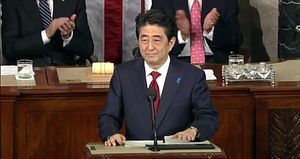On Saturday morning, the Japan’s House of Councillors, the upper house in the country’s bicameral legislature, passed a package of controversial laws that will, for the first time ever, allow Japan’s Self-Defense Forces (SDF) to head overseas to defend allies, a departure from Tokyo’s post-war pacifist posture. The laws mark a significant development toward Japan becoming a “proactive” contributor to Asian peace, as Japanese Prime Minister Shinzo Abe frames the move.
While the new laws are seen with trepidation in neighboring South Korea and China, two states with a keen memory of Imperial Japan’s atrocities during the Second World War, other Asian states welcome the move. In particular, the Philippines welcomed the passage of the bill in Japan’s upper house.
Philippines’ Foreign Secretary Albert del Rosario issued a statement on Saturday: “The Philippines welcomes the passage of legislation on national security by the National Diet of Japan,” Del Rosario said in the statement. “We look forward to efforts that strengthen our strategic partnership with Japan and those that would contribute further to shared goals of greater peace, stability and mutual prosperity in the international community,” he added.
The statement is unsurprising for anyone that’s been observing the steady strategic convergence between the Philippines and Japan in recent months. As Manila’s perception of a rising threat from Beijing grows more acute, it has sought to forge closer ties with Tokyo, in addition to reinforcing its alliance with the United States. (As the security bills passed in Japan, the New York Times reports that Manila may consider granting the United States permanent access to Subic Bay once again.)
As my colleague Prashanth Parameswaran reported earlier this year, the Philippines and Japan have had an eventful year: they signaled an intent to upgrade defense ties in February, held their first-ever joint naval exercises in the South China Sea, where Manila is embroiled in various maritime disputes with China. They held a second exercise not long after. The Philippines has also participated in exercises with both the United States and Japan.
Japan’s new security laws won’t allow it to come to the direct aid of the Philippines in the case that Manila finds itself at war with China or another foe. Japan and the Philippines don’t have a formal alliance similar to the one that Tokyo does with the United States. Tokyo will, however, be able to deploy the SDF to assist the United States, which in turn would come to the aid of the Philippines. Thus, Manila’s reaction to the passage of the laws is unsurprising.

































